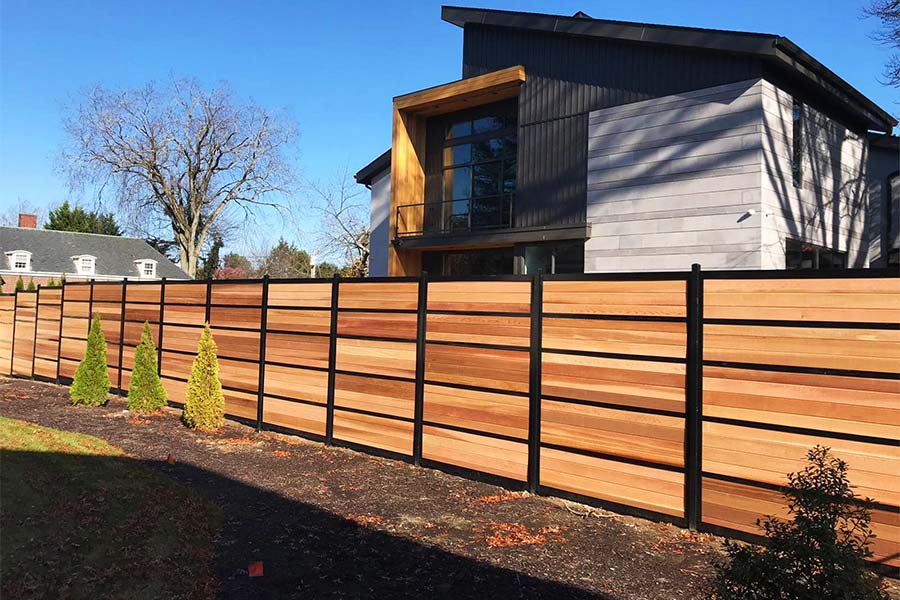Featured

Choosing the best fencing product is crucial for accomplishing the balance of toughness, looks, and capability that matches your building. Timber, vinyl, and light weight aluminum are preferred selections, each with special functions that accommodate certain demands. Here's an extensive check out the benefits and disadvantages of these three products.
Wood Secure Fencing. Pros:. Classic Charm: Wood uses an all-natural, classic appearance that complements various building designs. Personalized: It can be repainted or tarnished in a range of colors and styles. Inexpensive: Timber fencings are typically cheaper ahead of time than plastic or light weight aluminum. Eco-Friendly: As a renewable energy, wood is lasting and biodegradable when sourced responsibly. Cons:. Maintenance-Intensive: Needs regular discoloration, paint, or securing to protect against weather and pests. Much Shorter Life-span: Depending upon the kind of timber and climate, it typically lasts 10-15 years. Susceptability to Damages: Prone to rotting, warping, and termite damage without appropriate care. Wood is ideal for homeowners that value appearances and agree to invest time and initiative in upkeep to extend its life.
Plastic Fence. Pros:. Sturdy: Resistant to insects, rot, and climate, vinyl maintains its framework in extreme conditions. Reduced Maintenance: Requires little maintenance beyond occasional cleansing. Long Life-span: Plastic can last 20-30 years without considerable wear or damages. Versatile Designs: Offered in different shades, appearances, and styles, consisting of options that mimic wood. Cons:. Expensive Installment: Plastic fences are extra expensive to set up contrasted to timber. Weak in Cold Weather condition: Plastic can crack in extreme cold environments. Difficult to Fixing: If harmed, whole sections might need replacement, which can be testing to match. Plastic fence is a wonderful choice for those focusing on durability and minimal upkeep, even if it includes a greater upfront cost.

Aluminum Secure Fencing. Pros:. Rust-Resistant: Light weight aluminum does not corrosion, making it ideal for damp or moist areas. Lightweight however Strong: Offers stamina without being extremely heavy, which streamlines installation. Reduced Upkeep: Needs little bit greater than cleansing and periodic repainting. Durability: Light weight aluminum fencings can last for years without significant deterioration. Elegant Layouts: Frequently used for attractive purposes, light weight aluminum adds sophistication to any type of residential property. Disadvantages:. High First Cost: Light weight aluminum fencings are amongst the extra pricey choices. Minimal Personal privacy: Usually designed with open spaces, they don't block views or sound. Vulnerable to Damages: While sturdy, light weight aluminum can be dented or curved with hefty influence. Aluminum is finest matched for those who want a durable, fashionable fencing and don't call for full privacy.
Making the Right Option. Each material has its staminas and weak points:

Timber is ideal for eco-conscious customers and traditional aesthetics who don't mind maintenance. Vinyl benefits property owners looking for a weather-resistant, low-maintenance solution. Aluminum is a long lasting, attractive choice for those who desire sophistication and longevity. Consider your top priorities-- whether it's price, upkeep, privacy, or appearance-- and seek advice from a fence expert to pick the material that finest fulfills your requirements. A well-selected fence will improve your residential or commercial property for many years to come.
Latest Posts
Trade-In Value with Ron Marhofer Hyundai of Cuyahoga Falls
Published Apr 21, 25
1 min read
Montclare Auto Repair: Your Reliable Expert for Expert Brake & Engine Fixes
Published Apr 21, 25
2 min read
Unlock Exclusive Discounts with WyHy's Love My Debt Union Benefits
Published Apr 21, 25
1 min read
More
Latest Posts
Trade-In Value with Ron Marhofer Hyundai of Cuyahoga Falls
Published Apr 21, 25
1 min read
Montclare Auto Repair: Your Reliable Expert for Expert Brake & Engine Fixes
Published Apr 21, 25
2 min read
Unlock Exclusive Discounts with WyHy's Love My Debt Union Benefits
Published Apr 21, 25
1 min read